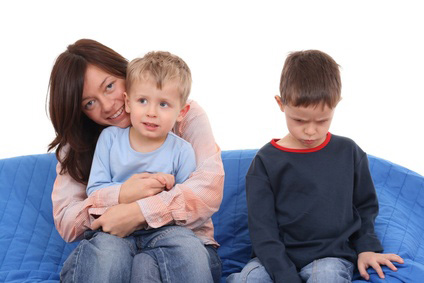一项最新国际研究显示,孤独症患者的弟弟、妹妹罹患这种精神发育障碍的风险可以高达19%,远高于早先推测的3%至10%。

这项研究共包含664名胞兄或胞姐患有孤独症的研究对象,纳入研究时,研究对象的平均年龄为8个月,其中三分之二在未满6个月大时即参与。这些婴儿成长到36个月时,约有19%患孤独症,其中男童占80%。研究还显示,如果家中不止一位胞兄或胞姐患有孤独症,那么较年幼的孩子得孤独症的风险会提高到32%以上。
孤独症也称自闭症,是一种严重的精神发育障碍,其概念由美国约翰斯•霍普金斯大学专家莱奥•坎纳于1943年首次提出。其症状一般在3岁以前就会表现出来,主要特征是漠视情感、拒绝交流、语言发育迟滞、行为重复刻板以及活动和兴趣范围的显著局限性等。目前全球约有7000万名患者,其中男孩的比例是女孩的4倍。
新研究成果的论文将刊登在美国《儿科学杂志》9月刊上。论文第一作者、美国加利福尼亚大学戴维斯分校教授萨莉•奥佐诺夫表示,这项研究具有重要意义:它可以为父母提供基因咨询;如果已有孩子患孤独症,它还可用作对其弟弟或妹妹早期干预治疗的参考。
生物探索推荐英文文章:
Autistic kids' siblings more likely to have condition
Siblings of kids with autism have a higher risk of being diagnosed with the disorder than previously believed, suggests a new study.
The analysis of more than 600 three-year-olds with an older autistic sibling found that almost one in five of them had an autism spectrum disorder, which includes Asperger's syndrome and similar conditions.
That suggests pediatricians need to keep an extra eye on those siblings, even as toddlers -- because early interventions with therapy and extra support might help keep their symptoms to a minimum, researchers said.
"We know that the brain at young ages is more amenable to change," said study author Wendy Stone, of the University of Washington Autism Center in Seattle.
"When children are showing signs (of autism) even before the diagnosis is official, we need to start thinking about, how can we help parents within the course of their everyday activities to promote their child's social and emotional development?" she told Reuters Health.
The findings, she said, also show that autism rates -- now estimated at about one in every 110 U.S. kids -- probably aren't going to decrease anytime soon.
Previous studies estimated that between 3 and 14 percent of autistic kids' younger siblings also had the condition.
Stone and her colleagues had the advantage of a large data set of kids with autism and their siblings, including 664 sibling infants seen at 12 different institutions. They recruited the young siblings to the study when most were younger than six months old, before they showed any symptoms.
Around their third birthday, doctors tested each of those kids for signs of autism.
By that point, 132 of the siblings, or close to 20 percent, had developed an autism spectrum disorder, the researchers report in Pediatrics.
Kids who had multiple older autistic siblings were twice as likely to be diagnosed with autism as those with only one sibling with autism. As has been shown before, boy siblings were also about three times more likely than girls to have autism.
Researchers have long known that genes play a role in predisposing kids to autism, but it's clear that "genetics is not the whole story," Stone said -- and there are still many unanswered questions about what causes the condition.
GUIDING PARENTS' DECISION-MAKING
Keely Cheslack-Postava, an autism researcher from Columbia University in New York, said that the rate of autism in siblings may be higher now because the definition of who has an autism spectrum disorder has widened to include more kids.
Still, she said, the one-in-five number "for an individual family is somewhat limited in terms of exactly what this information means," she told Reuters Health.
Stone and her colleagues said that it's important that parents of an autistic child have access to genetic counseling if they're thinking of having another kid -- but added that it's hard for doctors to evaluate each family's individual risk of having another autistic child.
What this does is "puts a much better estimate of risk in the hands of parents and clinicians, so hopefully that will help guide their decision-making more effectively," said Zachary Warren. He's the head of the Treatment and Research Institute for Autism Spectrum Disorders at the Vanderbilt Kennedy Center in Nashville, Tennessee -- one place where kids were recruited for the study.
Cheslack-Postava, who like Warren did not work on the new report, agreed with the authors that one of the key messages to come from the findings is the importance of early intervention for at-risk siblings.
"The most important public health implication of this higher observed recurrence risk is probably for awareness and attention to development in those children, in order to facilitate intervention as early as possible for children who could benefit from it," she said by email.
Researchers agreed that more work needs to be done to figure out what kinds of interventions might be most helpful for kids with the first signs of autism.
The research network is funded by Autism Speaks, an organization that promotes awareness of autism and funds research into prevention and treatments.







